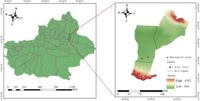In the quest for sustainable agricultural practices, a recent study has unearthed significant insights regarding the role of biochar and nitrogen fertilizer in enhancing soil organic carbon and modifying greenhouse gas emissions. Conducted over three years at the Qitai Wheat Test Station in northern Xinjiang, China, this field experiment meticulously observed the interplay between biochar and different nitrogen application rates in irrigated wheat fields.
The study involved eight distinct treatment groups, including approaches with varying combinations of biochar and nitrogen levels. The experimental configurations ranged from a control group with no additives (CK) to combinations utilizing nitrogen fertilizer at rates of 300 kg/ha and reductions down to 210 kg/ha alongside biochar application at 20 t/ha. Among these combinations, the most noteworthy results emerged from the treatment utilizing a 15% reduction in nitrogen fertilizer with the addition of biochar (BN2), which recorded an impressive 3.04% increase in soil organic carbon (SOC) and a substantial 30.91% increase in active organic carbon (AOC).
While enhancing soil properties, the increased application of biochar and nitrogen did lead to a notable rise in cumulative CO2 emissions, which increased by 9–48% compared to the control group. This exploration raises essential discussions about the dual impact of agricultural practices on soil health and climate change, as biochar’s ability to influence the microbial community significantly altered CO2 release rates.
Biochar, produced from the pyrolysis of corn straw, is recognized for not only improving soil fertility but also its potential to sequester carbon. The study’s lead authors elaborated on the critical findings, stating, “The combination of biochar application (20 t/ha) and a nitrogen dose of 255 kg/ha emerged as the most effective strategy for irrigated wheat fields in northern Xinjiang, enhancing SOC content while reducing carbon emissions.” This statement encapsulates the primary takeaway: that sustainable fertilization strategies can benefit crop yield and help mitigate the effects of climate change.
The implications of this research extend beyond Xinjiang’s wheat fields. Enhancements in SOC are crucial as they contribute to overall soil health, increasing fertility while reducing the environmental footprint of agriculture. The applied methodologies were rigorous, employing a randomized factorial design and a suite of soil assessments to determine the effects of each treatment across various measures of soil quality, including bulk density, pH, and microbial diversity.
Moreover, the diversity of soil microbes was found to be significantly impacted by the treatment combinations. The BN1 group, which included both nitrogen fertilizer and biochar, showed substantial differences in microbial functional diversity compared to the control group, which could have downstream effects on nutrient cycling and overall soil health.
In terms of agricultural practice, this study’s insights underline the necessity for farmers to consider integrated soil management approaches. By employing biologically active amendments like biochar in conjunction with controlled nitrogen applications, there might be significant improvements in both crop productivity and environmental responsibility. The findings encourage further exploration into long-term implications of these practices on soil ecosystems and climate mitigation.
Despite promising findings, the study authors cautioned that continued research is necessary to fully gauge the long-term effects of biochar application on soil health and sustainability—areas still viewed as emerging in the agricultural sciences. With climate issues at the forefront of global challenges, adopting science-driven agricultural practices that enhance soil carbon storage stands as a viable solution for the future of farming.




